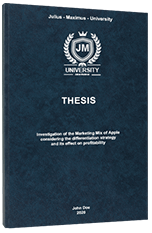
Operationalization is essentially the measurement of a phenomenon that is not directly measurable. Operationalization defines a concept to make it measurable, stand out and be understandable. This article talks about operationalization to a broader extent by explaining what is and isn’t an example of the concept.
Operationalization - FAQ
Operationalization is a process by which researchers set up indicators to measure concepts. Moreover, evaluators set indicators that help in measuring any changes in concepts. Qualitative researchers use this process in the definition of key concepts used in their research.
Tip: If you are done with your academic work, we can help you with dissertation printing!
Social anxiety is a concept that can’t be measured directly. Instead, you can operationalize it in several different ways. For instance, using a social anxiety scale to self-rate scores. Total incidents of recent behavioural incidents on avoiding crowded places and level of physical anxiety symptoms while in any social situations.
When it comes to psychological research, there are two main variables; the independent and dependent variables. The independent variable is a variable that is changed or manipulated, while the dependent variable is measured. It measures to see if the independent variable has an impact on human behaviour. Therefore, operationalized variable implies defining how the independent variable and dependent variable are measured.
Concepts can be defined as the phenomena or abstract ideas which are being studied. Indicators are ways of quantifying or measuring variables, while variables are characteristics and properties of the concept.
The difference between reliability and validity is that reliability is the consistency of a measure. Meaning whether you can reproduce the results under the same conditions. While validity means the accuracy of a measure. If the results are an actual representation of what they intended to measure.
Operationalization: Definition
Operationalization refers to converting abstract concepts into measurable observations. However, you can easily measure concepts like age or height while others like anxiety and spirituality can’t be measured. Through operationalization, one can systematically collect data regarding phenomena or processes that can’t be observed directly.
How to operationalize: Step by step
There are three main steps involved in operationalization:

Coming up with a program logic and intervention protocol
For a start, there should be a development of a program logic that describes what the program is for, change process, objectives, outcome and expected impact of the intervention. While coming up with program logic, it needs to have the support of an operationalized program logic. An intervention protocol for intervention has to specify:
- Which components are effective
- What is the importance of fidelity concerning adaptation? Is there room for adaptation of the content to the desired target group, does the protocol have to follow strictly?

In-depth description of a complete and an acceptable delivery for the intervention
Elements that you will use in the intervention that will have to be delivered during the study to preserve treatment integrity need to be defined in terms of pre-specified success. The elements will have to be put in criteria for each intervention component for all the sessions and written down in the intervention protocol. Once there is a clear definition of the successful procedure, there must be a clarification of opportunities for adaptation to the intervention content to receivers. Lastly, success criteria must be measurable.

Description of factors that determine receipt of intervention
For the intervention receipt, it is up to the program developers to define the crucial components that determine when a person gets an intervention. For instance, an intervention may occur at a higher organizational level. What are the determinants of an individual’s exposure to an intervention? A simple receipt measurement of the intervention is attendance or participation. However, researchers need to pre-define the level of participation that is needed.
Moreover, during an intervention, a participant’s level will determine the amount of intervention that an individual takes up. Some factors play a huge role in an individual’s responsiveness, such as knowledge, satisfaction, engagement and pre-intervention expectations. However, in some situations, these factors don’t play a big role, while they may play a huge impact in some cases.
in Your Thesis
Advantages and disadvantages

Advantages of operationalization
Operationalization brings about the possibility of consistently measuring variables over different contexts. Some of the advantages of operationalization include;
- Objectivity: Operationalization brings about a standard approach that organizations such as colleges and universities can use to collect data that does not provide room for biased or subjective personal interpretations regarding observations.
- Empiricism: While carrying out scientific research, it is done based on observing and measuring findings. Moreover, operational definitions are used in breaking down intangible concepts into characteristics that are recordable.
- Reliability: A desirable operationalization can be used for long by other researchers. If other people use operationalization procedures to measure the same things, then the results need to be the same as those your organisation got.

Disadvantages of operationalization
Operational definitions of concepts can have challenges at times. Some of the disadvantages include:
- Reductiveness: This procedure can easily miss out on subjective and meaningful perceptions of concepts through trying to eliminate complex concepts to numbers. For instance, asking students to rate their satisfaction with certain services offered in the university on a 10-point scale will not tell you the reasons why they were not satisfied.
- Underdetermination: Several concepts vary in different social settings and time periods. For instance, poverty is a global problem but there is no exact income level used to determine poverty across different countries.
- Lack of university: operationalization that is context-specific only help in preserving real-life experiences. However, they make it hard to relate studies, especially if there is a huge difference in the measures.
In a Nutshell
- Operationalization refers to a process that defines measuring a phenomenon that can’t be measured directly if its existence is directly affected by the phenomena. Operationalization, therefore, defines a concept that can be said to be fuzzy to make it measurable, understandable and distinguishable by empirical observation.
- On the other hand, it can be said to define the extension to which a concept such as medicine which is a health phenomenon, can be defined by several indicators like tobacco smoking or body mass index. Another example can be visually processing certain objects’ availability in an environment that can be inferred by taking note of specific aspects of the reflected light.
- In an example like health, it is hard to directly observe or measure the phenomena. Operationalization will help in measuring the existence and certain elements of the extension through measurable and observable effects that they contain.
- At times, there are competing or multiple definitions for the same phenomenon. Analyzing the same phenomenon with different definitions can help check if the results will be affected by different definitions. This is known as checking robustness.

